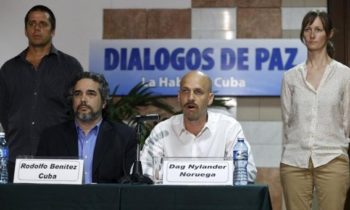 The Peace and Reconciliation Foundation revealed the FARC’s unilateral cease-fire reduced the intensity of conflict by nearly 90 percent. Representatives from Cuba and Norway, the two guarantor nations of the Colombian peace process, called Wednesday for a bilateral cease-fire in order to help deescalate the armed conflict that has grown bloodier over the last two months.“We call on the parties to continue their efforts to continue to advance in the discussion of the pending issues, including the adoption of a definitive bilateral cease-fire and end to hostilities,” read a communique by Rodolfo Benitez, the Cuban representative, and Dag Nylander, the Norwegian representative.
The Peace and Reconciliation Foundation revealed the FARC’s unilateral cease-fire reduced the intensity of conflict by nearly 90 percent. Representatives from Cuba and Norway, the two guarantor nations of the Colombian peace process, called Wednesday for a bilateral cease-fire in order to help deescalate the armed conflict that has grown bloodier over the last two months.“We call on the parties to continue their efforts to continue to advance in the discussion of the pending issues, including the adoption of a definitive bilateral cease-fire and end to hostilities,” read a communique by Rodolfo Benitez, the Cuban representative, and Dag Nylander, the Norwegian representative.
The pair also emphasized that these negotiations had progressed further than any other recent effort and that peace for Colombia was close at hand.
The massacre of 27 guerrillas in the department of Cauca including a member of the rebel’s negotiating team, forcing the FARC to suspend its unilateral cease-fire, which had been in effect since December 2014.
An investigation by the Peace and Reconciliation Foundation determined that the FARC’s unilateral ceasefire was extremely effective at reducing the violence, reducing the intensity of the conflict by close to 90 percent.
According to the foundation, there was an average of 179 armed clashes per month in 2011, before the start of the peace talks. Meanwhile during the five-month period that the FARC abided by its unilateral cease-fire there were only 91 conflicts.
Colombian President Juan Manual Santos ordered the resumption of airstrikes against FARC camps after a clash in April left 11 government soldiers dead. In addition to the recent bombing that left 27 rebels dead, government airstrikes killed another further 14 guerrillas including a high-ranking FARC commander.
Aside from the casualties, military confrontations between the guerrillas and the government also result in the displacement of campesinos. According to Semana magazine, the bombing in Cauca resulted in at least 352 displaced people. The Peace and Reconciliation Foundation said that the unilateral ceasefire resulted in at least 14,000 fewer displaces people.
Despite the overwhelming evidence that a truce dramatically reduces the intensity of the conflict, Santos has refused to agree to a bilateral ceasefire.
(telesurtv)
